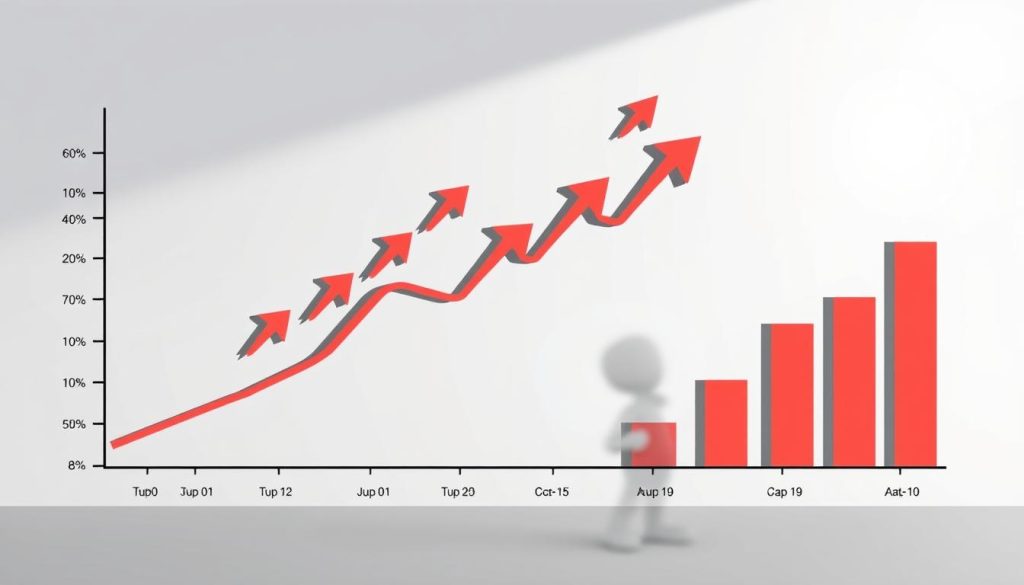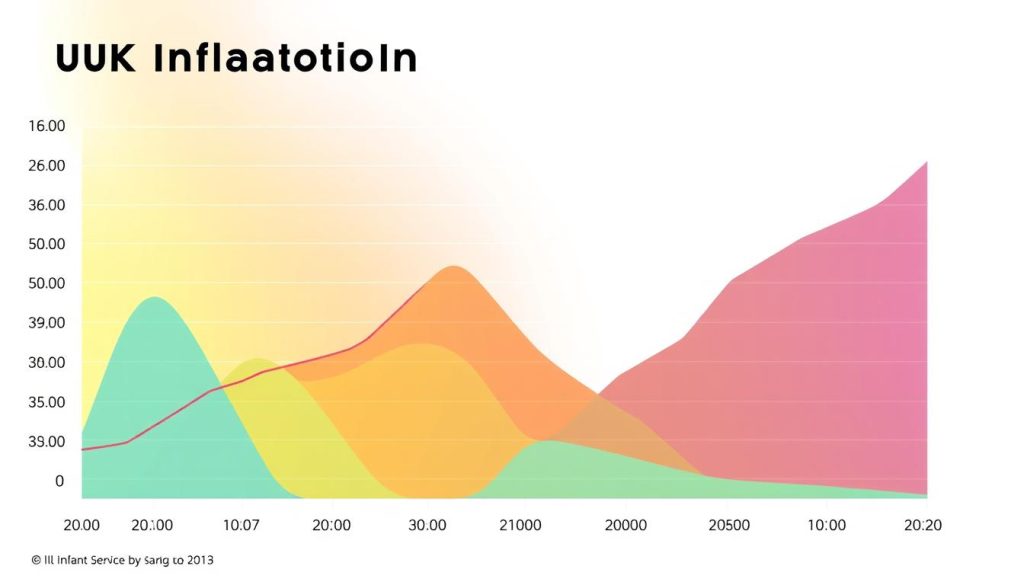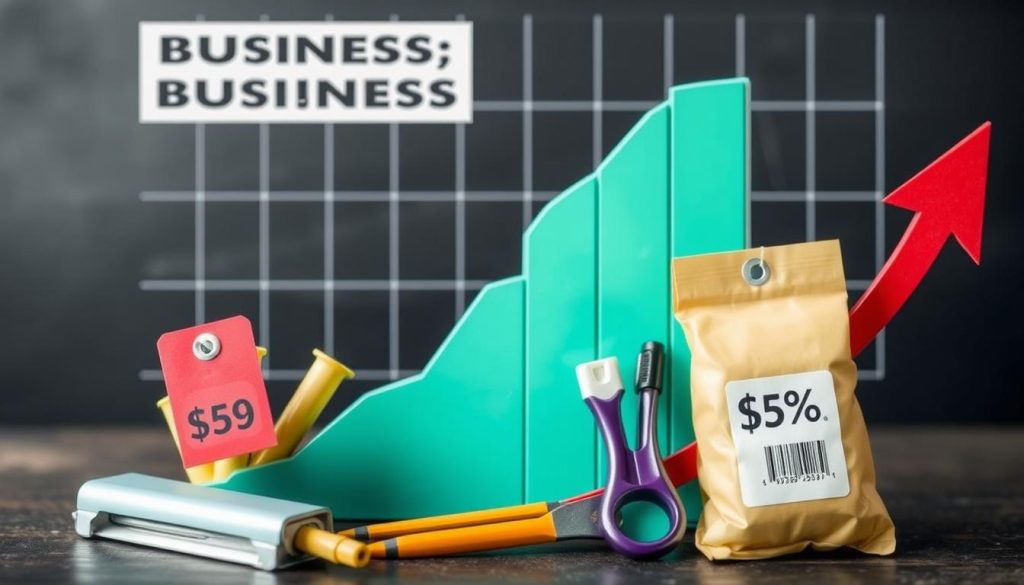Have you thought about inflation making business financial planning hard? Prices go up, reducing what consumers can buy. This forces businesses to change how they manage costs and set prices. As the UK faces economic changes, companies must grasp inflation’s effects on their strategies. They need to learn ways to lower these risks.
This article looks at inflation’s real effects on UK businesses. It shows how to handle uncertain economic times. Find out how businesses can remain strong despite economic ups and downs.
Understanding Inflation and Its Causes

Looking into inflation helps us understand its effect on the economy. It shows as a steady price rise in goods and services. This is seen in indicators like the Consumer Price Index (CPI) and Retail Price Index (RPI). A lot of factors cause inflation, which will be discussed further.
Definition of Inflation
Inflation means prices of goods and services go up over time. It’s usually tracked by CPI and RPI. These track price changes in a set group of goods, showing living costs.
Primary Causes of Inflation
Many things cause inflation, like changes in monetary policy or global disruptions. A big reason is when demand exceeds supply, raising prices. Fiscal policies, exchange rates, and economic shocks can also lead to inflation. Keeping an eye on these factors helps predict inflation.
Types of Inflation: Demand-Pull and Cost-Push
There are two key kinds of inflation: demand-pull and cost-push. Demand-pull inflation happens when demand in an economy outgrows what it can produce, pushing prices up. On the other hand, cost-push inflation occurs when production costs, like wages, go up. Businesses then pass these higher costs to consumers, raising prices.
Historical Context: Inflation Trends in the UK

The UK’s inflation trends have changed a lot due to major economic events and policies. These changes help us understand how UK inflation and economic trends have affected business strategies over years.
Post-War Economic Policies
After World War II, the UK saw huge economic growth and rising consumer demand. But, this growth also caused inflation to rise, which made the government step in to keep the economy stable.
1980s Recession and Recovery
In the 1980s, the UK faced a deep recession that led to big changes under Margaret Thatcher. Thatcher’s government used strict money control to fight inflation. This period was tough but necessary for stabilising the economy.
The 2008 Financial Crisis
The 2008 financial crisis hit the world hard, including the UK. It began with major financial institutions collapsing, causing a deep recession. UK businesses had to find new ways to deal with long-lasting inflation and economic challenges.
How Inflation Impacts Business Costs

Inflation greatly affects business, making things more expensive to do. It leads to high costs in getting materials and energy. This happens as prices keep changing. Also, as companies pay more for skilled workers, their costs go up.
Increased Production Costs
Inflation causes the cost of making goods to rise. This is because the price of raw materials and energy goes up. Businesses have to change how much they charge to keep making money. They must keep checking their financial plans to stay profitable.
Labour and Wage Inflation
The demand for good workers makes their wages go up during inflation. This means companies must offer better pay to get and keep the talent. They need to balance good wages with keeping their finances in check.
Supply Chain Disruptions
Global issues can lead to problems in getting goods, making prices go up. These problems add extra costs for businesses. Companies try to overcome these by making their supply chains stronger and finding other ways to deal with these issues. This helps them handle the effects of inflation.
Adjusting Pricing Strategies in Response to Inflation

Inflation impacts many areas, making it vital for companies to adapt their pricing strategies. They need to keep up with market trends while protecting their profits. Dealing with complex pricing models is key to staying competitive.
Many firms choose competitive pricing to remain significant. They study their rivals’ prices to set their own prices smartly. This helps attract buyers who are careful about spending. Keeping up with inflation makes their pricing strategies smart and aware.
Then there’s value-based pricing. It’s about setting prices based on how customers see the product’s worth, not just the cost to make it. Knowing what customers are willing to pay, even when prices rise, helps companies set the right prices. This boosts their earnings.
Using inflation adjustments in pricing methods is crucial. It means regularly changing prices to match current inflation rates. This stops companies from losing money when costs to produce goods go up.
Lastly, companies must always watch their costs and the market. This way, they can price their products properly. It helps them offer real value and stay ahead during inflation.
Inflation’s Impact on Small Businesses

Inflation hits small and medium-sized enterprises (SMEs) in unique ways. These businesses face big tests from economic pressures. But, with the right strategy, they can overcome and even flourish.
Challenges Faced by Small Businesses
Keeping cash flow positive is a huge challenge for SMEs. Costs of goods and services are going up. This affects how much they spend on operations.
Also, smaller businesses can’t always get good deals from suppliers. This makes it tough to manage rising production costs. SMEs need to be adaptable to stay afloat.
Opportunities for Small Businesses
Yet, inflation brings chances for growth too. SMEs can quickly shift and find new niches. This can lead to success.
By being innovative and understanding what customers want, they can make a profit. Having strong plans for change helps businesses deal better with ups and downs. This boosts their financial strength.
Sector-Specific Responses to Inflation

Inflation impacts sectors in different ways, needing unique strategies for profit. An analysis across industries shows how each sector handles inflation differently. Insights into these varied approaches are valuable.
Retail Sector
The retail world wrestles with whether to absorb costs or charge customers more. Its strength is in changing business methods, like altering prices and making the supply chain better. Retailers work hard to keep customers loyal with added services, even when costs go up.
Manufacturing Sector
Manufacturing feels the heat from higher prices for materials and energy. Companies might use different materials or energy to keep costs down. They also use clever stock control and work closely with suppliers to stay stable.
Service Industries
Service sectors face different challenges with pricing when costs rise. Services like healthcare can’t easily change prices, but hospitality can. Investing in technology and being more efficient are key ways to cope. These actions make the service sectors stronger against inflation.
Case Studies: How Inflation Affects Real Businesses

Real-world examples show how different businesses tackle inflation. These studies teach us about innovation, managing costs, and staying strong economically. They show how various sectors remain successful during times of inflation.
Case Study 1: Retail Company
Tesco, a big British retailer, faced higher costs for products and delivery because of inflation. To manage, they used a smart pricing strategy. They used data to set the right prices and kept customers happy. Tesco also worked better with suppliers and improved their supply chain. This helped them stay robust economically and keep their customers loyal.
Case Study 2: Manufacturing Firm
Jaguar Land Rover (JLR) dealt with increasing costs for materials and worker pay. They used more automation and made their production better. This helped control the cost of their final products. JLR also bought from a wider range of suppliers. This strategy kept their operations going smoothly and showed how manufacturing can adapt to inflation.
Case Study 3: Service Provider
In services, Deloitte UK saw higher wages and running costs. They invested in training their employees more. This made the team more productive and clients happier. Deloitte also used new technologies to make their work more efficient. This example shows how service businesses can stay economically strong when facing inflation.
Financial Strategies to Mitigate Inflation Risks

In times of economic uncertainty, it’s important for businesses to plan well against inflation. Having a solid strategy helps manage costs and keep profits up. Businesses should think about the following points:
- Cost Control: It’s vital to keep a tight check on costs. Regular checks and reviewing expenses can find ways to be more efficient. This means spending only where necessary.
- Inflation-Proof Investments: Putting money into things like real estate, commodities, and Treasury Inflation-Protected Securities (TIPS) can protect it from inflation’s effects.
- Hedge Against Inflation: Using financial tools like futures, options, and swaps can act as a shield against inflation. This reduces the risk of losing money due to price changes.
- Financial Planning: Planning ahead allows businesses to get ready for inflation challenges. It involves preparing for different scenarios to find the best way to deal with them.
Also, it’s vital to spread investments wisely. Having a varied set of assets can help withstand inflation, ensuring financial security in the future. Being careful with costs now helps keep finances healthy later on.
The Role of Government Policy in Controlling Inflation

Government policy is key in keeping inflation under control, ensuring economic stability. It does this by using monetary, fiscal, and regulatory policies. This way, inflation stays manageable.
Monetary Policy
The Bank of England plays a big part in controlling inflation with monetary policy. A main way it does this is by adjusting interest rates. Raising interest rates makes borrowing less attractive. This reduces spending and investment, helping to curb inflation.
Lowering interest rates can boost the economy but could lead to higher inflation if not done carefully. The Bank of England targets a specific inflation rate, often 2%, to keep the economy stable and predictable.
Fiscal Policy
Fiscal policy affects inflation through government spending and taxes. For example, more government spending can push up demand, making prices go up. On the flip side, less spending or higher taxes can lower demand. This helps keep inflation in check. It’s important to find the right balance to avoid too much inflation or deflation.
Regulatory Measures
Regulatory measures help keep prices stable and prevent inflation from getting out of hand. They may include setting price limits on important goods and services. They also involve watching over financial markets to stop speculation that can lead to price bubbles. Ensuring competition in the economy is also vital. Through these policies, the government can prevent excessive inflation.
How Technological Advancements Help Counteract Inflation
Technological progress is key in reducing inflation by making businesses more efficient and inventive. Using automation and improving the supply chain are ways technology helps. These methods bring widespread advantages.
Automation and Efficiency
Automation is a big way tech fights inflation. It lets companies do more with less manual work. This cuts costs a lot.
Automated systems improve how work is done, making it faster and with fewer mistakes. This reduces the costs linked to errors and delays.
Innovative Supply Chain Solutions
Tech developments in supply chains also lessen inflation’s impact. They help companies avoid delays and make transport easier. By using better supply chain tools, companies can avoid problems before they happen.
This leads to smoother business operations and helps in keeping prices stable. It’s essential in fighting the effects of inflation.
Employee Relations and Wage Management During Inflation
In times of inflation, businesses face the challenge of managing wage increases and keeping good relations with workers. They must be strategic in discussing pay with employees, keeping talented staff, and focusing on improving skills for better productivity.
Negotiating Wages
Negotiating wages when prices soar is tough but necessary to keep staff driven. It’s important to find a balance between fair pay and the company’s budget. Open talks with employees can set the right expectations and avoid disputes.
Employee Retention Strategies
With inflation, the fight for skilled workers gets tougher. Keeping skilled workers becomes a key goal for companies. Offering flexible job options and chances for career growth helps keep workers happy and less likely to leave.
Training and Development
Boosting training and development is crucial during inflation to keep productivity high and wage costs in check. By improving employees’ skills, companies run more efficiently and ease the strain of higher wages. Ongoing training also makes for a more dedicated and skilled team.
The International Perspective: Inflation’s Global Impact
Inflation affects global markets differently. This may influence businesses in various ways. Knowing these differences helps firms deal better with international challenges. We’ll explore the interactions between inflation rates, global supply chains, and trade policies worldwide.
Comparing Inflation Rates Internationally
Looking at inflation rates from different countries offers important insights. For example, the UK might see a moderate inflation rate, while emerging economies face higher ones. This comparison is essential for businesses aiming to grow globally.
Global Supply Chains
Inflation strongly affects global supply chains. Rising costs can disrupt how products are made and sent. It’s vital to manage supply chains well to lessen these impacts. Companies around the world may have to rethink their strategies to manage inflation’s varied effects.
Trade Policies and Inflation
Trade agreements and policies are key to managing inflation’s impact. Good trade deals can help keep prices stable by lowering tariffs. On the other hand, protectionist policies might make inflation worse by blocking cheaper goods and services.
It’s important to understand how trade policies and inflation are linked. This knowledge can help businesses plan better. They can then handle inflation changes more successfully.
Planning for Future Inflation: Long-Term Strategies
It is crucial for businesses to be ready for future economic ups and downs. Looking ahead and making plans is key to avoid the shock of inflation. This section talks about three important steps: scenario planning, choosing investment tactics, and managing risks. These steps help keep businesses strong.
Scenario Planning
Scenario planning lets businesses picture different future economic situations and how to react to each. This method helps them stay ahead of changing inflation rates and make smart choices. It’s more about being ready for anything than guessing what comes next. This way, businesses can quickly adjust to new economic conditions.
Investment Strategies
Picking the right investment strategies is crucial for keeping your business profitable when prices go up. Spreading out investments and choosing ones tied to inflation helps. Investing in real things, like property, is also a good idea. These tactics protect the money a business makes and help it grow, even when costs rise.
Risk Management Approaches
Having a good plan for dealing with risks helps businesses stay safe from unexpected money problems. This means checking regularly for weak spots, using hedging to keep risks low, and keeping enough cash handy. Doing these things makes a business more stable financially. It helps them deal with the challenge of high inflation better.











